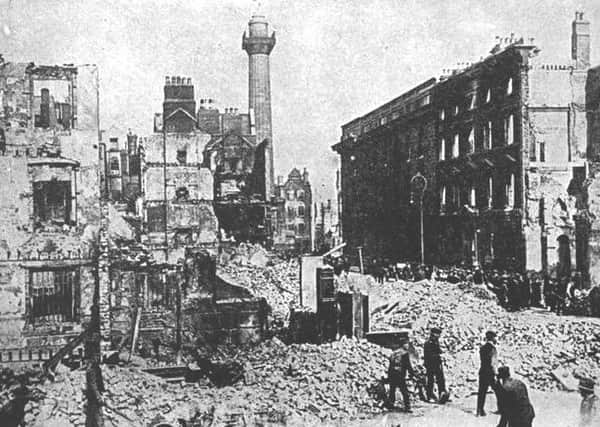The Easter Rising was not a just war, says former Taoiseach John Bruton


John Bruton explained his thinking in a speech in Iveagh House in Dublin yesterday. [read the full 3,500 word speech here]
The one-time Fine Gael leader is the latest Catholic critic of the notion that the Rising was a just war, including Father Seamus Murphy, the NI Attorney General John Larkin and the columnist at Irish Catholic, David Quinn.
Advertisement
Hide AdAdvertisement
Hide AdMr Bruton, who was speaking as part of an RTE series entitled ‘Reflecting the Rising’, said that the recent dissident murder of Adrian Ismay was done of the back of the 1916 Proclamation’s claim to a 32-county sovereign state.


He outlined how the authors of the Proclamation swept aside the desire of unionists in Ulster not to be governed from Dublin.
He began his talk by saying that President John Kennedy once said that a “nation reveals itself” by the events and people it commemorates.
He said: “This state is a rule of law based, parliamentary democracy, which has integrated itself with its European neighbours by peaceful negotiation and compromise, which is militarily neutral, and where its military power is subordinate at all times to the civil power.
Advertisement
Hide AdAdvertisement
Hide Ad“If we decide that we will choose from our history a ‘foundation event’, and choose as that foundation event the 1916 Rebellion and Proclamation, does that accurately reflect, or reveal, who we really are in 2016?”


Mr Bruton said: “The Proclamation, which our schoolchildren are now being asked to regard as the founding stone of our democracy, left no room at all for democratic negotiation.
“Therein lay the seeds of Civil War because, in politics as in life, compromise and negotiation are essential to a civilised life.”
Mr Bruton, above, said the Proclamation signatories were fully aware of the “fierce resistance in North East Ulster, even to Home Rule Administration, let alone to a Republic”.
Advertisement
Hide AdAdvertisement
Hide AdBut in the Proclamation “this political reality was swept aside”.
Mr Bruton said: “The wish of Ulster Unionists not to be governed from Dublin, was assumed by the Proclamation’s signatories, not to have been a conclusion that they had come to freely themselves, but only the result of ‘careful fostering’ by ‘an alien government’.
“At the very least, this did not show very much respect for the seriousness, or the reasoning powers, of those who had signed the Ulster Covenant, only five years previously.”
Mr Bruton noted that the Proclamation referred to the ‘gallant allies’ in Europe, namely the German, Austrian and Ottoman Empires. “It was not neutral in the war. It took the German side,” he said.
Advertisement
Hide AdAdvertisement
Hide AdHe said that the Republic was proclaimed to exist as a ‘Sovereign Independent State’ of 32 counties once it was declared outside the GPO.
“Such a state does not even now exist. Yet its existence was declared to ‘indefeasible’ in the words of the Proclamation. A recipe for endless conflict.
“It is on the strength of, and in pursuit, that unfortunately absolute and unqualified claim, that people continue to be killed, including Adrian Ismay a couple of weeks ago.”
Mr Bruton said the Rising had been started in a heavily populated, built up area.
Advertisement
Hide AdAdvertisement
Hide Ad“For every Volunteer killed (including those executed afterwards), three Dublin civilians died as a result of the fighting the volunteers’ leaders had initiated.”
In his speech, Mr Bruton outlined the criteria for a ‘just war’, including “armed aggression or governmental policies (eg genocide) threatening the civilian population”.
He concluded: “Ireland was not being attacked in 1916. In fact the volunteers were allowed by the authorities to drill freely ... Governmental policies, in the previous years, had, in many respects, been particularly beneficial to Ireland. Old Age pensions and social insurance ... had been introduced. The landlord system had been completely overturned. All that had been achieved by democratic methods.”
Another criterion for a just war is that war should be a last resort. “Given that the principle of Irish legislative independence had already been conceded, in a [Home Rule] Bill passed into law only a year and a half previously, it is hard to argue that starting a rebellion in 1916, and the War of Independence of 1919 to 1921, were, either of them, a ‘last resort’.”
Advertisement
Hide AdAdvertisement
Hide AdMr Bruton said that Home Rule “was accepted even by the Conservatives as a ‘fundamental fact’, the only issue outstanding being that there be no ‘forcible coercion of Ulster’ to go in under it”.
He added: “I believe the Home Rule government would not have got jurisdiction over all [Ulster] counties. But, after all the killing and dying of the 1916 to 1923 period, and the Treaty of 1921, the Free State did not get jurisdiction over those counties either!
“Nor after the ‘Armed Struggle’ from 1970 to 1998, does this state have such jurisdiction today. Indeed, under the Good Friday Agreement, we no longer claim it ... Further, the [excluded Ulster counties] would have been under direct rule from Westminster ... This would have meant much better protection for the northern nationalist minority than there were under the Stormont arrangements, that were set up in response to the Armed Struggle initiated in 1916.”
He said: “The same principle of legislative independence, conceded to Ireland in September 1914, was conceded to Canada, Australia and other dominions. We know now that they all proceeded to full sovereignty, without the suffering and bitterness of war.”
He said the rebel violence came “at a terrible price”.
Advertisement
Hide AdAdvertisement
Hide Ad“Given the value Christians place on each human life, those who take life, have the primary burden of proof to discharge. It was for them to prove that no other way was open. I believe that burden of proof was not discharged.”
Mr Bruton said that “the focus on the 1916 Rebellion, and particularly on its uncompromisingly worded Proclamation, as representing the core values of our state, is a worry at a time when there is already such a level of disdain for ‘politicians’, and for the compromises that are a necessary part of democratic politics.”